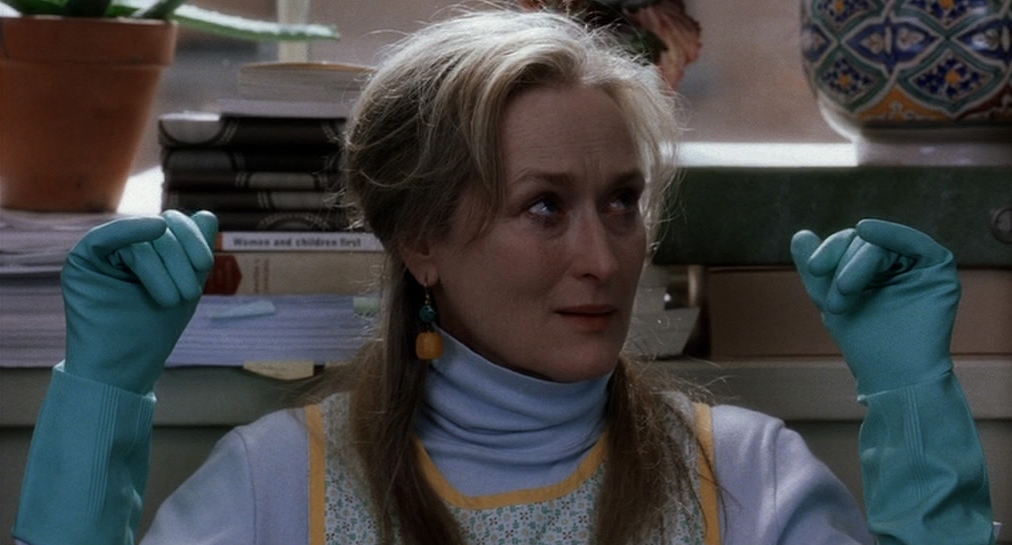[Editor's Note: for the centerpiece of our 10th anniversary celebration of The Hours, I asked Joe Reid and Nick Davis if they'd like to talk about the movie and it turned out they already had. A heretofore unpublished conversation. I'm sure you'll enjoy it as much as I did! - Nathaniel ]

JOE REID: Three (!) years ago, I had planned out an end-of-decade feature for my own blog, wherein I would converse about my favorite films of 2000-2009 with a selection of writer friends. The logistics of it got away from me, but I did manage to get started. One such conversation lost to history was with my fellow Film Experience Podcast panelist Nick Davis on the subject of The Hours. With the ten-year anniversary of The Hours upon us, I thought I'd dig up this abandoned reflection and let it see the light of day.
***
JOE: The Hours is absolutely on the list of movies from the past decade that I truly, unabashedly loved. I suppose there's something chromosomal about a movie starring Meryl Streep, Nicole Kidman, and Julianne Moore (and Toni Collette, and Allison Janney, and Miranda Richardson). But it's more than just watching all these fantastic actresses hand off scenes to each other for two hours. It's also the suicides and the repression! Of course, after signing you on to correspond with me on this entry -- and many thanks for that, by the way -- I checked up and found that your feelings on it were decidedly more ambivalent. Is this an "every time I watch it I feel differently about it" kind of thing, or is it always the same kind of mixed bag for you? As for me, while there are a BUNCH of aspects of The Hours I'm hoping we can touch on, for some reason, my most recent screening of the movie made me anxious to mention two things: kitchens and hands. I couldn't stop watching Nicole Kidman's hands, either when Virginia is gripping her pen with a desperately tight claw grip or deep inhaling those cigarettes. And Meryl Streep separating egg yolks as she's unraveling in her kitchen has always been a favorite image.
And that brings me to the whole kitchen thing...
kitchen melodrama and sapphic smooches after the jump...
Laura Brown's is her prison; Clarissa Vaughan's is where she tries to keep up appearances (Richard does still love the crab thing), and Virginia Woolf is afraid of hers -- though that's another one of my favorite scenes, Virginia tormenting her kitchen staff in a fit of mischief and misdirected rage.
Here are my questions to you, to kick things off: What was Laura's hands moment? In a movie this dogged in its triple-parallels, I have to believe she had one that I'm forgetting. And do you think kitchen metaphors for repressed women is too on the nose, or did The Hours do right by them?
NICK DAVIS: Thanks for having me, Joe! Even though, as you say, I am sometimes a little abashed or frustrated at my affection for The Hours, I still feel completely caught up in it, and I'm so happy to talk to someone who loves it. I'm amazed how many people really have it in for this movie. I have heard on occasion from folks for whom The Hours is "too depressing" or too full of, um, thoughtful and interesting grown-up women. I can't believe how much air time still goes to Nicole's nose when there's so much else to talk about. So, moving to other body parts. I think of Laura's hands frequently patting her already flat hair and just as often smoothing the front of her dress. Or is she just wiping the flour off her hands? One way or another, this gal is nervous, but I like that she's nervous in such a remote, aloof way, rather than spazzing out with actorly versions of jangled nerves. Not my absolute favorite Moore performance, but an interesting one, and a different kind of woman than we usually meet in the movies.
I also think of her hand reaching for those pill bottles before she drops Ricky at Margo Martindale's and heads to the hotel. Julianne went on record about how hard she fought against this shot, since she based so much of her performance on the book's idea that Laura doesn't necessarily consider suicide till she's already sunk in the hotel, feeling moonish because "Mrs. Dalloway" is over. This one image of what Laura does with her hands does change the story and the woman, but in the context of the film, I like its suggestive power.
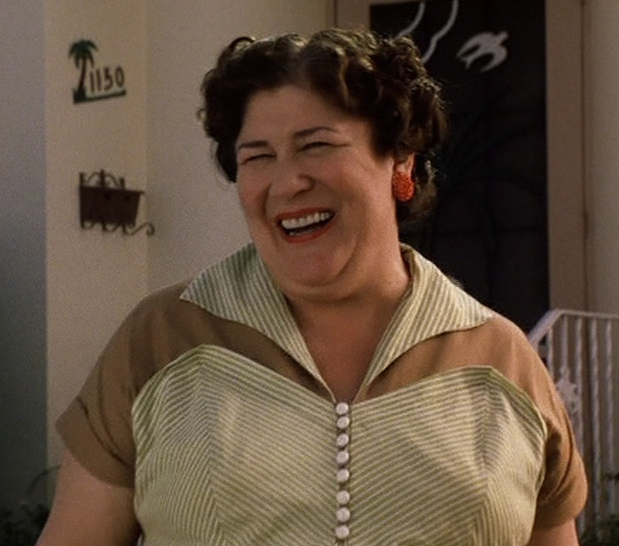 Margo Martindale, spontaneous babysitterWhat DO you think of all this suicidal stuff, since you mentioned it right up top? Does it bug
you, like it does a lot of Hours haters? I haven't even gotten to kitchens or Clarissa or Virginia
yet, or how much I would have loved it if MY mom had dropped me occasionally at Margo Martindale's, but I gotta pass the ball back to you.
Margo Martindale, spontaneous babysitterWhat DO you think of all this suicidal stuff, since you mentioned it right up top? Does it bug
you, like it does a lot of Hours haters? I haven't even gotten to kitchens or Clarissa or Virginia
yet, or how much I would have loved it if MY mom had dropped me occasionally at Margo Martindale's, but I gotta pass the ball back to you.
JOE: I figure the suicide stuff is as good a subject for a major theme as any. And despite the fact that the movie begins and ends with a suicide -- and the fact that Kidman's Woolf delivers one of the more lyrically beautiful justifications for suicide I can recall ("to know [life] for what it is, to love it for what it is, and then to put it away") -- I don't find the moods in the film oppressive. Though, honestly, I can't entirely blame anyone who would, considering Laura Brown's pivotal decision to choose against killing herself only puts off the suicide forty years down the road ... and onto her son. But that's not really a dealbreaker for me.
Speeeeaking of Richard, though, and of suicide, what did you think of the position the film puts him in? Specifically, how he is at all times an unspeakably oppressive burden on everyone in his life, whether as an unceasingly loving and clingy child (for Laura), a passionate and beautiful lover (for Louis), or a nasty and demented nurse patient/specter of lost love and youth (for Clarissa).
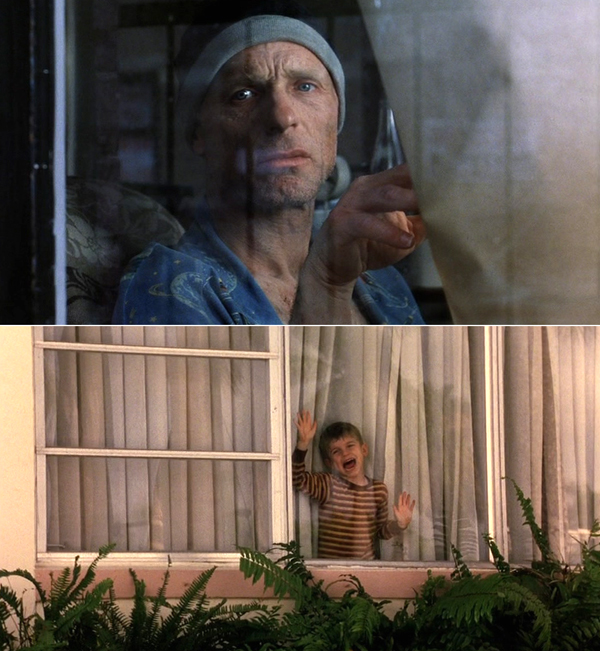
Leaving Richard was the defining moment that saved Laura's life (and certainly improved Louis's mood, ridiculous and fortunate as it is), and his tumble out his loft window essentially gives Clarissa her life back. I find it all incredibly rich, and this time around, I found Ed Harris's oft-maligned performance admirably unsympathetic, but I did get a bit queasy that the story set him up as such a boogeyman, seemingly from birth. To answer your question, would that we all could have spent some time in the care of Margo Martindale. And you give me an excuse to mention Martindale and Eileen Atkins (as Clarissa's flower-shop owner) delivering note-perfect cameos where they both cast the same sideways glances at the lead women, seeing right through but not calling them on it. Atkins, in particular, gets off those wickedly condescending barbs about Richard's book -- which in turn allows Streep to do some excellent acting-through-averted-eyes that I love so much. (Linda Bassett's Nelly serves the same function in Virginia's story, as it happens, in that kitchen scene I love so much.)
And i can't get out of this email without co-signing you on the maddening hyper-focus on The Nose. I think I still hold a bit of a grudge against Denzel Washington for throwing a bit of tarnish on Nicole Kidman's Oscar Moment™with that foolishness. So talk to me about Richard. And (though you didn't bring it up), the trio of actressexual makeout sessions (Moore/Collette, Streep/Janney, and Kidman/Richardson) that left me both wide-eyed at the audaciousness and yet also kind of confused as to how some of them came across so expressionistic as to take me out of the movie.
NICK DAVIS: Happy to oblige, especially since another thing that can happen when people talk about The Hours is that it becomes a story about these three women, when in fact there are all these other interesting people swooping around and reading each other, sometimes in that "House of Labeija" way. They see through each other's drag acts - as women, as men, as artists, as lovers, as versions of each other and of themselves - and as you mention, Eileen and Margo and the excellent Linda Bassett aren't above throwing a little shade. (I love that Bassett's Nelly can't even be bothered to hide it when she's caught impugning the boss.)
Jeff Daniels, who I think is just wonderful as Louis, is too giggly and then too fit to be tied by all of Clarissa's contradictions to throw shade in any focused way, but Claire Danes, as Meryl's daughter, seems to be honing quite a bullshit detector. On Richard: I've gone all over the map on Harris's performance, and I'm surprised he doesn't ace it, though those astonishing eyes sure give Richard the right air of seeing too much of you all at one time. He's never for a moment convinced me that Richard is seeing "electrified jellyfish" anywhere, but then, Cunningham didn't, either. The fact that he's hard-edged and something of an albatross might seem more callous on the film's part if it didn't help ameliorate the irritatingly sainted figure of the tortured artist who keeps threatening to pop up all over this material. Kidman's severity and impatience and hunger for other people are so much interesting than Harris's, but if he doesn't quite convince me of the character, he avoids some of the "takes" on Richard that would have annoyed me even more.
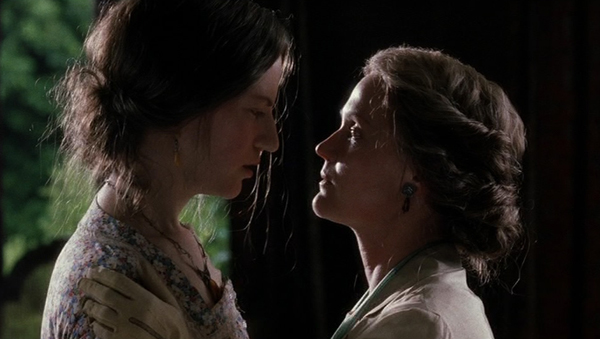
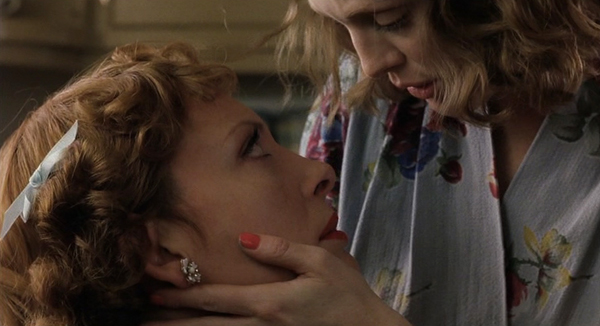 Nicole & Miranda. Juli & Toni
Nicole & Miranda. Juli & Toni
But enough "adapted from the Pulitzer-winning novel" high-mindedness. Let's go all MTV Movie Awards and rate some kisses.
Vanessa/Virginia: A bracing window into Virginia's jealous hunger for beauty and danger and tenderness, and how she'll seize the rare moments when she has a shot at tasting all three. Miranda is terrifically freaked out by this moment, though I admit I miss the novel's suggestive, chapter-closing beat that Vanessa "returns the kiss."
Kitty/Laura: I love how vitally this scene pulls out the combo of garishness and sensuality that Toni Collette can be so good at, but I'm never QUITE convinced of the scene, I have to say. Laura's distressed, tiny-voiced attempts to console her and then to redeem the moment after the post-kiss discomfort sinks in are more poignant to me than the actual kiss.
Sally/Clarissa: Quite a buss! And suddenly, Clarissa looks as ravenous as Virginia often does, but for what? And can Sally give it to her? Are we seeing the full force of her bottomless codependence, now that its illustrious object of so many decades has left the building? What will she do with all that solicitous maternalism? I'm maybe less convinced than you that Clarissa has just gotten her life back. I don't find The Hours oppressive, either, but I fear for Clarissa, and a little for Sally, at the end of this movie.
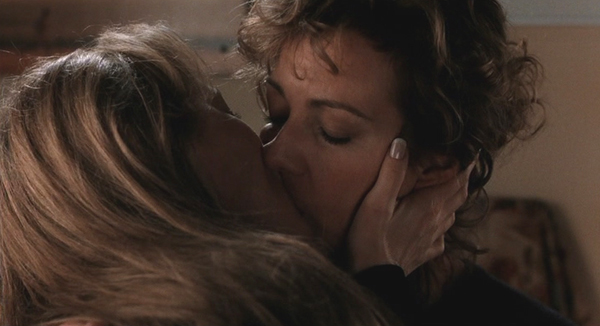 Sally & Clarissa: love rekindled or bottomless codependence?
Sally & Clarissa: love rekindled or bottomless codependence?
JOE REID: You know, that's a take on the Clarissa/Sally kiss that I never quite considered, but one I'll keep with me for my next viewing. As it was, this last viewing was the first time I'd really been patient enough to notice Sally sneaking back into bed while Clarissa pretends not to notice. Obviously, that relationship is cracking at both ends, and in the end Sally feels like a mirror image to Kitty (and to a lesser degree Leonard Woolf) as characters I wish we could see more of, and who would certainly warrant their own highly pedigreed parallel-lives motion picture. (Of course, to Toni Collette's credit, I do feel like we see the fullness of Kitty in that one short scene.)
NICK DAVIS: All that and we haven't even hit the score. Which I love. Eat it, Glass haters. Eat it like it's wackadoo, crumbs-in-the-frosting trashcan cake.
CONTINUE ON TO PART TWO
likes us on facebook and never miss an update - we do like multipart articles
follow Joe & Nick on twitter as they are brilliant and you will enjoy
